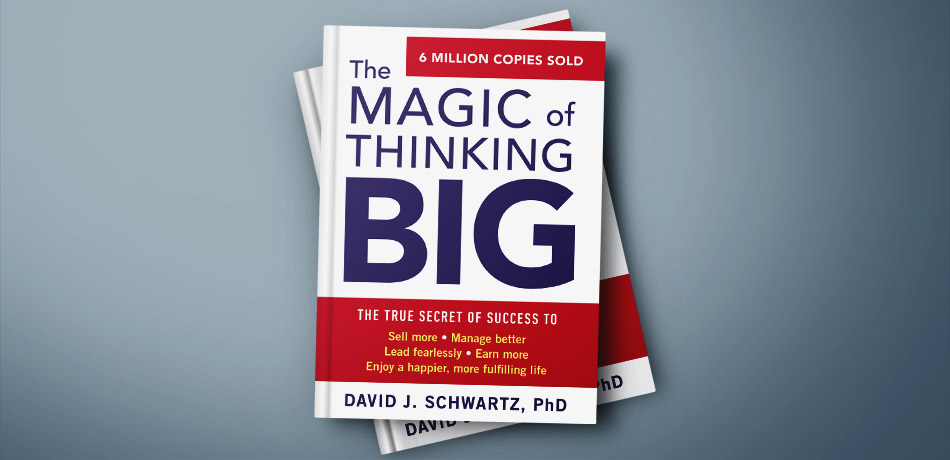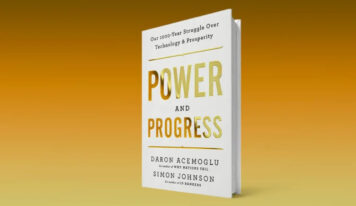How changing your mindset can be the secret to success to sell more, manage better, lead fearlessly, increase revenue, and live a more prosperous and happier life
Core Ideas:
1 – “You can succeed by believing you can”.
2 – “Think big. The size of your success is determined by the size of your belief. Think about small goals and expect small achievements. Think big goals and have big success.”
3 – “See things not as they are, but as they can be. Visualization adds value to everything. A great thinker visualizes what can be done in the future, he is not stuck in the present.”
4 – “Your appearance ‘speaks’. Make sure it says positive things about you. Never leave home without making sure you look like the kind of person you want to be.”
5 – “Great people, at the top of the industry, the arts, sciences, and politics, are human, warm. They specialize in being pleasant.”
6 – “Excellent ideas are not enough. A single reasonable idea, put into practice and developed, is 100% better than a wonderful idea that dies because it was not followed through.”
7 – “The difference between success and failure lies in one’s attitudes towards setbacks, failures, discouragements, and disappointing situations (…) Study obstacles to pave your path to success. When you lose, you learn and move on to win the next time.
8 – “Goals are as essential to success as air is to life.
9 – “Success and the ability to lead other people – that is, getting them to do things they wouldn’t do without being led – go hand in hand.”
10 – “Regardless of what you do and your occupation, higher status, and higher pay come from one thing: increasing the quality and quantity of what you produce.”

About the author:
David J. Schwartz (1927-1987) was a professor at Georgia State University in Atlanta but became known for his work as a motivational and leadership consultant. He lectured for more than three thousand trade associations, sales, and seminar management groups through his company Creative Educational Services. World fame came in 1959 with the publication of the best-seller The Magic of Thinking Big, which has sold more than 6 million copies and is still considered a classic of the self-help genre. The second and last book of his career, The Magic of Getting What You Want, was published in 1983.
Preface
The author recalls a sales convention in which it was pointed out that one of the participants, without any further education, connections, or financial conditions, had a much better annual performance than his colleagues. The secret would be to think big, not to limit oneself to small goals. The example is given so that he can conclude to the readers that the size of bank accounts, satisfaction, and even happiness depends on the size of the thought. That would be the magic of thinking big.
To prove the point, he recalls that great thinkers of the past already knew this secret.
– “As one thinks in his heart, so he is,” from the prophet David.
– “Great men are those who realize that thoughts move the world,” by Emerson.
– “There is nothing good or bad, but the thought makes it so,” from Shakespeare.
The author also invites us to think about the successful people we know, who prove that thinking big works magic in their lives.
Believing in great results is the driving force, the power behind mankind’s great books, businesses, organizations, and scientific discoveries. Believing in success is the basic and essential ingredient for successful people. Believe that you will succeed, and you will.
Disbelief, on the other hand, is the negative power. Doubt and disbelief denote the subconscious desire to fail, which is responsible for most failures. Think with doubt and forget, think victory and succeed.
Respect successful people, but don’t overvalue them. Learn, observe, study, and believe that you can surpass them so as not to be eternally left behind. After all, your life is the product of your thoughts. Think big and you will grow in success, remuneration, and quality of life. Realize that as long as you don’t believe in yourself, no one else will.
Your mind is a factory of thoughts, whose production is run by two managers, Mr. Triumph and Mr. Failure. Mr. Triumph is responsible for producing positive thoughts and reasons why you can, you are qualified, and you will succeed. Mr. Failure makes you feel weak, and inadequate, with negative assumptions.
Both are incredibly obedient, so you must pay close attention to your thoughts. The more you feed one of them, the stronger it gets.
The wisest thing to do is to dismiss Mr. Failure. You don’t need him. Use Mr. Triumph 100% of the time. When anything comes to mind, ask for his help, and he will show you how to succeed.
1. BELIEVE IN THE POWER OF YOUR SUCCESS
How to develop the power of believing:
Think success, not failure. Replace negative thoughts with positive ones, because thinking about success conditions the mind to create plans to produce more success.
Always remember that you are better than you think. Successful people don’t have superpowers, they are just ordinary people who have developed beliefs in themselves and what they could do. Never diminish yourself.
Think big. The size of your success is determined by the size of your belief. Big ideas and plans may even be easier to achieve than smaller plans.
- CURE YOURSELF OF THE DISEASE OF FAILURE
Something important at the beginning of studying and setting goals is to watch people, to have examples of both what to do and what not to do. When we think of the unsuccessful people we know, one disease they all have in common comes to mind, the “excuse”.
It is about making excuses for a mediocre life, right after complaining about having it. Giving vague and useless reasons for not having, not doing, not being, not performing, not achieving. Just like positive or negative thoughts, excuses also stay in the subconscious, until they reach a point where they prevent the person from improving his or her life.
There are 4 most common types of “excuses”. The first is “my health is bad” – one of the lamest excuses, since it is hard to find someone who is 100% healthy, negative thinking can worsen many illnesses, and most of them don’t prevent you from doing a lot of work. Even if you have some physical difficulty, don’t define yourself solely by this and don’t necessarily see it as an obstacle to your life goals.
The second most frequent excuse is “but you have to be smart to get along”. By saying this, you both overestimate others and underestimate yourself. And you forget that the thoughts that guide your intelligence are much more important than the amount of intelligence you have. With an optimistic attitude, a person of average IQ can be more successful than a gifted person.
Another very common excuse is to say “I’m too old (or too young)” to justify mediocre performance. Try to see your current age in a more positive light, set goals to do what you want to do, and enjoy your productive years instead of just complaining.
The last type of “excuse” is the unlucky one, which says “my case is different, I attract bad luck”. Everything happens due to one or more logical causes, including accidents. Accept the law of cause and effect, and instead of waiting for luck to bring you promotions at work or a profitable business, try to qualify yourself and have attitudes that lead to success.
Believing in great results is the driving force, the power behind mankind’s great books, businesses, organizations, and scientific discoveries. Belief in success is the basic and essential ingredient of successful people. Believe that you will succeed, and you will.
Disbelief, on the other hand, is the negative power. Doubt and disbelief denote the subconscious desire to fail, which is responsible for most failures. Think with doubt and forget, think victory and succeed.
Respect successful people, but don’t overvalue them. Learn, observe, study, and believe that you can surpass them so as not to be eternally left behind. After all, your life is the product of your thoughts. Think big and you will grow in success, remuneration, and quality of life. Realize that as long as you don’t believe in yourself, no one else will.
Your mind is a factory of thoughts, whose production is run by two managers, Mr. Triumph and Mr. Failure. Mr. Triumph is responsible for producing positive thoughts and reasons why you can, you are qualified, and you will succeed. Mr. Failure makes you feel weak, and inadequate, with negative assumptions.
Both are highly obedient, so you must pay close attention to your thoughts. The more you feed one of them, the stronger it gets.
The wisest thing to do is to dismiss Mr. Failure. You don’t need him. Use Mr. Triumph 100% of the time. When anything comes to mind, ask for his help, and he will show you how to succeed.

- BUILD CONFIDENCE AND DESTROY FEAR
Fear is real, it is the number one enemy of success, and identifying it is not enough to defeat it. The greatest cure is action, replacing indecision and procrastination. Hope is the beginning of healing, but it needs action to win the battles.
Practically speaking, first, isolate your fear, and determine exactly what is making you apprehensive. Then move to action. Hesitating only increases fear and undermine self-confidence, so action must be immediate.
Remember that your thoughts have a memory bank. While unsuccessful people dwell on bad experiences, successful people quickly let go of possible sources of fear by depositing positive thoughts in the same place in the bank. Think about the things you have gratitude for, such as your family, your friends, and your health.
If your fear is of other people, such as fear of public speaking, for example, remember that while the speaker deserves due importance, so do you. Many of these problems are solved when we stop underestimating ourselves.
Finally, work with conscience. Some unethical attitudes may generate small temporary successes, but they undermine courage and get in the way of real victories. To think confidently, act confidently. And to be more confident, there are also simple techniques that can be adopted daily, such as: standing in the front rows of the audience, making more eye contact with people, walking 25% faster, stating your opinion in public, and smiling more.
- HOW TO THINK BIG
First of all, it is necessary to abandon once and for all the self-deprecation that so hinders careers. A tip to stop this mindless habit is to list your five greatest qualities, and then list the successful people you admire. This way you will realize that there are successful professionals who may excel less than you in certain skills since each person is unique and thoughts lead to success.
Another tip is to start working on your public speaking right away. Those who think big generate positive, optimistic, and innovative images in their interlocutors’ minds. So exercise this skill: use positive words and phrases to describe yourself and others, and also to encourage people. When speaking in public, focus on the goal of conveying the message and don’t pay attention to small insecurities.
The person who thinks big is, first of all, optimistic. Therefore, they are in the habit of seeing things not only as they already are, but as they can be. Visualizing what something can be in the future helps with confidence, setting goals, and the procedures to get there. It also exposes your full potential, as well as the potential of your project and the people involved. By seeing the positive potential and the real importance of everything, you can also avoid unnecessary stress and fights.
Finally, don’t waste time on trivialities. Thinking big is focusing attention on big goals. Before getting involved in any issue, consider whether it is something really important.

5, HOW TO THINK AND DREAM CREATIVELY
It is common to associate creative thinking with scientific discoveries or the elaboration of literary and artistic works. However, the ideas we have for overcoming everyday challenges, both at home and work, are also creative thinking. After all, the concept involves discovering new ways of doing something, and how these new ways enhance success in various areas of life.
To have a more creative routine, and one whose ideas give good results, the first step is to believe that they can be realized. As pointed out earlier, when you believe, you find ways to do it. Eliminate the word “impossible” and all the other negative expressions from your vocabulary, define a goal, and list all the reasons why it can be accomplished.
Be more receptive to new ideas. Be more experimental, and break with fixed routines. Think about progress, avoiding old ways of working, and welcoming new techniques that generate better results. Accept opportunities to do more and better, because demand also generates creative ideas to save time efficiently.
Another way to exercise creative thinking is by communicating with customers, colleagues, and suppliers. Encourage people to talk more, and focus on what they say. Test your points of view in the form of questions, so that others can refine their ideas. Interaction stimulates creative potential and thinking big is also about knowing how to listen.
- YOU ARE WHAT YOU THINK YOU ARE
Some people command greater respect and better treatment than others, and the secret is also in the thinking. Others see us as we see ourselves. We receive the treatment we think we deserve. As with other phases of mental programming for success, earning respect is simple.
One of the aspects that help arouse this better treatment is appearance. Dress the way you want to be seen. Besides influencing what others think, dressing like someone important generates more confidence in yourself, and, consequently, positive thoughts that attract success. And in the same way that a product with luxury packaging fetches higher prices, you also get better deals when you are well-dressed. Invest in quality garments that don’t go out of style.
The look helps sales, but it is not the only relevant factor. So be sure to value your work. By thinking and verbalizing how important your current role is, you show that you can perform tasks of greater responsibility while inspiring colleagues, leaders, and subordinates.
Even if you are in a subordinate position, you can act as your leader through a mental exercise, talking to yourself. Evaluate your work, give yourself feedback, and you’ll be better prepared for conversations with leaders or clients, as well as facilitating self-improvement. Sell yourself.
Finally, elevate your thoughts, and think like the important people. When in doubt, ask yourself, “What would someone important think about that?” Improving your thoughts improves your actions and helps you on the road to success.
- MANAGE YOUR ENVIRONMENT
The environment in which we live shapes the way we think. Living with negative people makes you think that way and makes it harder to reach your goals. So be careful not to “contaminate” yourself with complaints or discouraging comments.
Just as successful people are not influenced by negative people, they also do their best to positively transform the environment in which they live. By making yourself available to answer questions and give advice to colleagues, you help to shape a whole circle of people who think positively.
Follow the examples of the successful ones: avoid gossip, have constructive conversations, ask for advice from the more experienced, and seek out companies for positive exchanges of experiences and information.
- MAKE ATTITUDES YOUR ALLIES
By observing attitudes, we can read minds all the time. After all, attitudes are the reflection of thought. The way we act reveals what we think. So if you want to know what colleagues, customers, or leaders think about your work, pay attention to facial expressions, gestures, and tones of voice.
Likewise, you can improve your attitudes to make the best impressions: show that you are proactive, that your counterpart is important, and that the service you provide is a priority. By showing enthusiasm, you will receive it back. Therefore, keep your speech and gestures upbeat, be the bearer of good news, and celebrate it.
By giving importance to each person you serve, you will also feel important. Try to call each person by name, and show that you appreciate the interaction. By doing so, maintain the attitude of prioritizing the service, and delivering a job beyond expectations.

9 . THINK ABOUT OTHER PEOPLE
It is almost impossible to walk the path to success alone, even more so in a corporate environment or in contact with teams and clients. On this path, the help of other people is fundamental. Therefore, include in your plan to be sociable, interesting, pleasant, and well-connected.
Have you noticed that leaders are always the first to introduce themselves? Important people take the initiative to build good relationships. To follow a good example, make sure that others remember your name, and take note of the correct spelling and pronunciation of your interlocutors’ names to avoid future mistakes. Also, take note of contacts you may need in the future. Finally, try to say nice things to make a good impression.
When you have already established a relationship, follow the rule of respecting the differences. Nobody is perfect, and most of the time it is better if you keep your negative opinion to yourself. Instead, try to see the good qualities in others. A generous interaction can help you better understand others and win friends. Courtesy makes everyone feel good, including you.
- GET INTO THE HABIT OF ACTING
Every important job requires someone who thinks about action. When we look at the stories of important people, we notice that they are always proactive, or “activist”, while mediocre people keep a passive, “passivation” posture when facing challenges.
To achieve success, be an “activist”. Use action to cure fear and gain confidence. Taking action is fighting fear, while procrastination feeds it. Remember that no project gets off the ground without action. If there is an obstacle, crusade to overcome it. If there is a problem involving the team, volunteer to solve it.
To become that proactive leader, you can do some mental exercises. Think in terms of “now”, and avoid thinking in terms of “tomorrow”, “next week”, and “later”. After all, a delayed deadline can evolve into “never”. By acting as quickly as possible, you are the “I’m starting right now” person, coveted as a manager, employee, salesperson, and other roles.
- HOW TO TURN FAILURE INTO VICTORY
The difference between a successful track record and failure lies in the way we view and deal with obstacles and disappointments. Unsuccessful people often blame other people or external reasons for their failures and give up on projects after the first few lost battles.
To achieve success, use failures as a learning experience – analyze where you went wrong, correct your shortcomings, and move on to the next steps. This is part of the process of becoming responsible and a better professional while blaming circumstances or bad luck gets you nowhere.
Combine persistence with experimentation. Try other paths with the same goal, but avoid pulling any punches. After all, some changes in direction or approach can be beneficial. Remember that every situation has a silver lining. Find it to get over the discouragement and get back on the road to success.
- USE GOALS
Goals are essential for success, but they depend on new postures and planning. After all, the desires themselves can be killed by fears, self-depreciation, other people’s influence, or focus on other responsibilities. In order not to get lost in illusions, surrender to your desires, but set goals to realize them step by step.
For this realization, let yourself be guided by your higher goal, so you will have better ideas and decisions on the way. Break it down into smaller goals with deadlines, so that you feel closer to success with each small goal achieved. Invest in yourself, because more qualifications and better contacts help you get there faster.
Some situations may mean detours, but if the obstacles are used for learning, success will still be at the end of the road.

- HOW TO THINK LIKE A LEADER
As we saw earlier, success cannot be achieved without the help of other people. Therefore, success and the ability to lead go hand in hand. However, what does it take to think like a leader?
First of all, you need to exchange ideas with the people you wish to lead. To gain the respect of subordinates, partners, or customers, you need to understand how they think. Throughout this process, the approach must be human, so that the exchange is genuine and without communication noises. Leadership cannot be conquered without first gaining the trust of the interlocutors.
Another characteristic of a leader is to think big, believe in the progress, and encourage it among the team. Seek improvement and high standards in everything you do, even outside the workplace. Finally, take the time to think alone about the best solutions to personal and professional problems, as if you were in a conference with yourself.
The magic of thinking big can be used in the most varied – and most crucial – situations. If negative people try to discourage you, think big. If you think you don’t have what it takes to succeed, think big to realize your importance and value your qualities. If some conflict is inevitable, think big to evaluate if it is worth wasting time on it. If there is a sense of defeat, think big to use failures as learning and overcome them.
And if you find that progress is slower than you expected, think big to turn problems into action. The habit of thinking big can help even in love relationships because only positive thinking values the qualities of others and the attitudes to captivate them. By thinking big, and following the guidelines in this book, you have a better chance of achieving success in the different areas of your life.
FACTSHEET:

Title: The Magic of Thinking Big
Author: David J. Schwartz
First edition: Wilshire Book Co.
Images: Disclosure/Freepik , Unsplash
Review: Gisele Cristina Navarro
![[Experience Club] US [Experience Club] US](https://experienceclubus.com/wp-content/uploads/2021/03/laksdh.png)










![[Experience Club] US [Experience Club] US](https://experienceclubus.com/wp-content/uploads/2021/03/logos_EXP_US-3.png)







